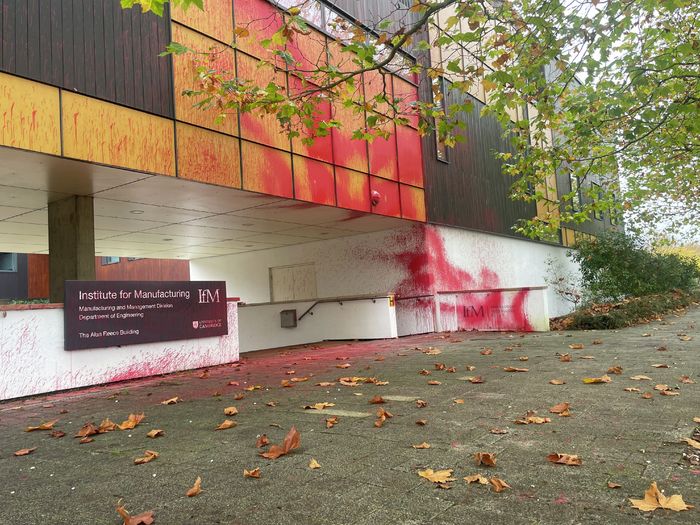Pro-Palestinians stage protest over Balfour declaration
Demonstrators burned a copy of the declaration which announced British support for a homeland ‘for the Jewish people’

Pro-Palestinian protesters burnt a copy of the Balfour declaration yesterday evening (02/11) – a document which announced British support for a homeland “for the Jewish people”.
The protest, which took place outside Trinity College, was organised by Cambridge for Palestine.
Demonstrators condemned Lord Balfour, the former British Prime Minister and Trinity alumnus, who signed the declaration on 2 November 1917.
One protester told Trinity to “taste the fire you inflict upon the Palestinian people” as the declaration burned. “Cambridge is the belly of the beast” and “is complicit in the genocide in Palestine,” protesters said.
They called on Cambridge to divest from Israeli weapons manufacturing, and said they “will not forgive and forget for this imperialist university”.
The Balfour declaration announced the support of the British government for the establishment of a “national home for the Jewish people” in Palestine, which was then an Ottoman region with a minority Jewish population.
It was signed 107 years ago yesterday (02/11), prompting what protesters called “107 years of genocide”.
Last night's protest was not the first in Cambridge to target Lord Balfour. In March, a pro-Palestinian activist slashed a painting of the former Prime Minister held at Trinity College. Palestine Action, who organised the protest in March, said Lord Balfour “gave away the Palestinians’ homeland – a land that wasn’t his to give away”.
Yesterday evening protesters celebrated the “brave activist” involved in slashing the artwork, who “painted his portrait with the blood that remains on his hands today”.
Yesterday, pro-Palestinian activist students also sprayed the University Institute for Manufacturing with red paint, over their links to companies with ties to Israel.
Palestine Action, the group responsible, targeted the front of the building, after stating that the Institute was a “centre of complicity”. They said Cambridge had painted “blood on the institution’s walls for blood on the institution’s hands”.
 News / Under 3% of applicants for Cambridge academic jobs are successful7 April 2025
News / Under 3% of applicants for Cambridge academic jobs are successful7 April 2025 News / News in Brief: cats, Camelot, and construction woes6 April 2025
News / News in Brief: cats, Camelot, and construction woes6 April 2025 Comment / Cambridge’s gossip culture is a double-edged sword7 April 2025
Comment / Cambridge’s gossip culture is a double-edged sword7 April 2025 Sport / Previewing the 170th Boat Race7 April 2025
Sport / Previewing the 170th Boat Race7 April 2025 Lifestyle / Which college brunch should be next on your list?6 April 2025
Lifestyle / Which college brunch should be next on your list?6 April 2025






